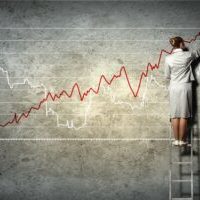-
Why stagnation?
The U.S. economy has been stuck in stagnation for a decade. The GDP growth rate has been only 2.2% per year since the recovery from the Financial Crisis and Great Recession of 2008-09 began. That is far below the growth rate in past post-recession recoveries since the end of World War II.
-
Does Iran’s economic fate depend on a lifeline from China?
China has increased its oil purchases from Saudi Arabia by 43 percent in April. There is every indication that China will continue to increase its buys from the kingdom during the course of this year—to substitute for Iranian oil and, perhaps, for U.S. oil.
-
Traditional measures of unemployment are missing the mark
We’ve heard it countless times in recent media accounts: The economy is at “full employment.” The most recent jobs numbers, out the first week in May, show the official unemployment rate, and applications for unemployment benefits are at a 50-year low. The last time a recovery was able to push the unemployment rate to these […]
-
Money on the Left: Confronting Monetary Imperialism in Francophone Africa
Ndongo Samba Sylla on the history of political economy in pre- and post-colonial Africa, the theoretical bases and political stakes of the anti-CFA Franc movement, and how Modern Monetary Theory (MMT) ought to inform current and future efforts to restore political and economic sovereignty to West African nations.
-
Review of Alan Nasser’s, Overrripe Economy
Alan Nasser has written a masterful book, one that belongs in every serious leftist and socialist library, and one that certainly deserves to be widely and extensively read.
-
Guaido “hires” an economic hitman (Venezuelan debt)
Washington’s actions in August 2017 drove Venezuela out of the international financial system and disabled the country from issuing debt for purposes of refinancing the debt acquired in previous years, as well as using foreign banks.
-
Scientists against the machine
Jane Shallice examines the history of radical research at the British Society for Social Responsibility in Science.
-
Imperialism, a Marxist understanding
Imperialism benefits imperialist governments and corporations, but also the mass of the populations in the powerful countries. The marxist perspective explains how.
-
“There is no alternative” to managing the economy and the climate
The United States is the country most easily positioned to address climate change but it has done likely the least out of any rich country. China, a country significantly less wealthy than the United States, has likely done the most. In fact, a recent study provides some evidence that China’s carbon dioxide emissions peaked in 2013 and are declining in large part due to changes in China’s industrial structure, which includes pilot programs for pricing carbon, among many other things.
-
Colored Property & State Debt with David Freund
In this episode, we talk with David Freund, associate professor of history at the University of Maryland. David is the author of Colored Property: State Policy and White Racial Politics in Suburban America, an award-winning book that tracks how the language of racial exclusion was re-coded in terms of markets, property, and citizenship in the post-World War II era.
-
Why so hostile? Busting myths about heterodox economics
Does accepting the term heterodox economics mean we accept our marginal disciplinary status? No. On the contrary, we use the term in order to challenge this marginalization. If people find the heterodox label confusing, we should be able to clarify where we are coming from.
-
Making excuses for unemployment: The myth of a “skills gap”
The current labor force participation rate of prime age workers, those 25-54 years, is a case in point. It remains below the previous peak rate in 2008, and even further below the peak rate at the turn of the century. We would need an additional 1.2 million employed prime age workers to match the 2008 labor force participation rate and 2.5 million more to match the turn of the century rate. Still it appears that at the present moment unemployment is no longer a major political issue.
-
A Climate Emergency Manifesto to avert climate catastrophe
The panic button needs to be hit to declare climate emergency. We need serious action now; there is no more time to waste.
-
Pasqualina Curcio: ‘Hyperinflation is a Powerful Imperialist Weapon’
“Unilateral coercive measures…[directed by the U.S. against Venezuela] affect the entire population in a deliberate and systematic manner. That is why, in accordance with the Rome Statutes [of the International Criminal Court], they are crimes against humanity.”
-
The Atlantic illustrates everything that’s wrong with media coverage of Venezuela sanctions
“Trump’s Venezuela Policy: Slow Suffocation,” an Atlantic report (4/17/19) by Uri Friedman and Kathy Gilsinan, passed up a rich opportunity to expose the humanitarian pretexts for economic intervention, and instead exhibited the worst tendencies of corporate media coverage of U.S. policy in Latin Ame
-
Seven theses on the Capitalist Democratic State
What is the capitalist democratic state and how should it be confronted? This question has bedevilled the left for generations. On the one hand, a social democratic conception of the state as a neutral institution that needs to be occupied and captured by bureaucrats with the right ideas has lead to experiments in socialist governance that have failed to overcome the private power of capitalists and turned toward neoliberal reversals
-
Beholden to corporatism: how The Guardian sold out the working class
A lot of companies and entities folded, vanished or ended up in severe trouble in 2008. Bear Sterns, Alfred McAlpine, Virgin Megastores, Merrill Lynch. But perhaps one of the more overlooked and important disestablishments was the Scott Trust.
-
PepsiCo and Monsanto’s bogus court cases are war on Indian farmers
At the heart of the struggle is capital’s need–Monsanto and Pepsico’s–to continuously enclose spheres and generate surpluses from creating a monopoly over something that it does not actually own.
-
We thought it was merely a stone, but it carried away our wealth
n Venezuela, the political leadership of the oligarchy beg for the men in green to set aside the Constitution, as Juan Guiadó and the Venezuelan right-wing opposition attempted a military coup in Venezuela this Tuesday.
-
Modern Monetary Theory (MMT)—A Response to Henwood
Neither a Job Guarantee nor a Green New Deal will be won without brave, strong social movements. When it comes to building these movements, we joyfully follow the leadership of more capable community organizers and politicians.




















